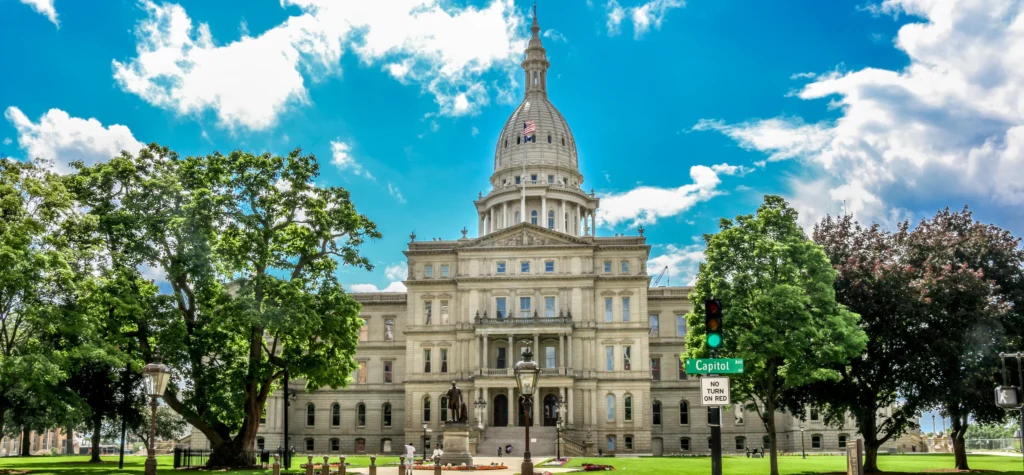Lawsuit challenges new Michigan marijuana tax, would upend roads deal
Portrait of Craig Mauger Craig Mauger
Lansing — An industry group that represents cannabis businesses in Michigan filed a lawsuit Tuesday afternoon, challenging a state law that was signed hours earlier to impose a 24% wholesale tax on marijuana.
The tax, scheduled to take effect Jan. 1 in order to increase funding for roads, was at the center of a compromise that ended a months-long budget standoff between Democrats and Republicans in the Capitol last week. Gov. Gretchen Whitmer signed the tax hike into law on Tuesday.
But the suit from the Michigan Cannabis Industry Association asks the Michigan Court of Claims to upend it, arguing the change should have required supermajority support from the Legislature, which it didn’t get, because it amends a ballot proposal that voters approved in 2018.
“The lawsuit details how the last-minute, late-night process occurred in violation of a range of other constitutional provisions,” said Douglas Mains, one of the lawyers. “The association is asking the court to strike the tax in its entirety.”
Otherwise, the suit, authored by attorneys with the law firms Honigman and Dykema Gossett, contended the public would be harmed by the Legislature’s “usurpation of constitutional safeguards that protect initiated laws from legislative interference.”
A large crowd gathers outside of the Michigan State Capitol to protest against a potential tax increase on marijuana sales on Tuesday, Sept. 30, 2025 in Lansing.
The case could make it all the way to the Michigan Supreme Court, where the state’s high court would have to rule on the legality of a budget deal that’s been championed by both top Democrats and Republicans in recent days.
“Amidst so much uncertainty caused by a chaotic tariff strategy and a national government shutdown, Michigan is showing everyone how to get things done,” Gov. Gretchen Whitmer said Tuesday. “In the weeks and months ahead, we will build on this momentum and come together on commonsense tools to create and retain good-paying jobs.”
The Michigan Cannabis Industry Association represents about 400 licensed marijuana businesses. Last year, Michigan’s recreational marijuana retail sales came in at about $3.2 billion, according to monthly reports from the Cannabis Regulatory Agency.
Michigan voters approved a ballot proposal to legalize recreational marijuana and to institute a 10% excise tax on retail sales in 2018.
The language of the Michigan Regulation and Taxation of Marihuana Act (MRTMA)— the initiative that was approved by voters — says the law includes an excise tax that’s “imposed on each marihuana establishment and on each person who sells marihuana.” It also says businesses are barred from selling marijuana “that was not produced, distributed and taxed in compliance with this act.”
The lawyers for the marijuana industry group contended the 2018 law is the “exclusive mechanism for imposing excise taxes” on cannabis products in Michigan.
To amend a voter-approved policy, under the state Constitution, three-fourths of the lawmakers in the House and Senate would have to support the change. While the new wholesale tax wasn’t amended directly into voter-approved law, the lawyers argued it effectively amended it.
The 24% new tax didn’t get three-fourths support in the House or Senate. In the Senate, only 19 of the 37 lawmakers supported it.
The new tax was embedded in a separate law called the Comprehensive Road Funding Tax Act (CRFTA).
“It is impossible to construe CRFTA independently without reference to MRTMA,” the new lawsuit said. “CRFTA is therefore fundamentally dependent on MRTMA.”
Supporters of the wholesale marijuana tax, like Rep. Alabas Farhat, D-Dearborn, have said they didn’t directly amend the 2018 initiative, so they didn’t need a three-fourths vote.
“We have some great lawyers, some fabulous lawyers…” Farhat said last month. “They’ve all looked at this and they’ve made it clear that this will withstand a legal challenge, being that it’s at the first point of sale and not at the retail side.”
The nonpartisan Michigan House Fiscal Agency has projected the wholesale marijuana tax would create about $420 million in additional revenue for roads annually. That amounts to about 25% of the total investment in roads that lawmakers made this year
Article available HERE.

